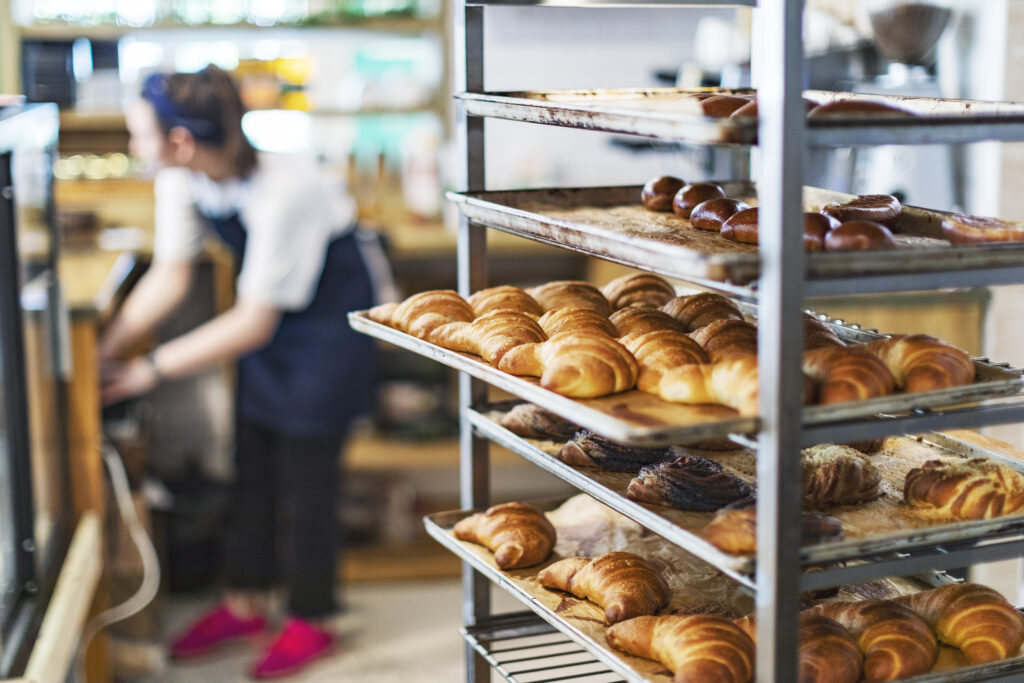
Trademark, copyright – what’s the difference? A look at common baking-industry scenarios
December 6, 2023
By Reagan Seidler, Barrister and Solicitor, Smart & Biggar
 Photo: Getty Images / JulPo
Photo: Getty Images / JulPo Intellectual property (IP) has always been a part of the baking industry. From recipes to product names, packaging, and new ways of manufacturing. IP can either be a way to stay ahead of competition or a good way to get sued. Bakers, test your knowledge of intellectual property rules with our new quiz!
Imagine being sued for changing the temperature of your oven. It happened! (In 1881.)
Thomas Hunter, a Toronto builder, claimed to have built the first furnace capable of being fed while in use. His precise invention was inserting a firepot into the oven, with a door and inclined guide above the level of the hearth through which coal could be fed. On this basis he obtained a patent, and sued Mrs. Carrick, a local baker, who had built a similar oven for herself.
Ending this fight required intervention from the Supreme Court. After years of arguments, the court finally threw out Mr. Hunter’s case, finding there was nothing novel enough about Mr. Hunter’s “Improved Oven” to warrant a lawsuit.
How much do you know about Canada’s IP rules? Take this quiz to find out. Scroll down to see the answers – and don’t cheat!
The quiz
1. You have developed a recipe for a new, award-winning bread. What type of IP protection can help protect your recipe?
A. Copyright
B. Trademark
C. Patent
D. None of the above
2. I can talk about a competitor in my advertisements so long as what I say is truthful.
A. True
B. False
3. “Product of Canada” and “Made in Canada” mean the same thing.
A. True
B. False
4. Which of these things cannot be registered as a trademark?
A. A descriptive product name (e.g. CINAMMON BREAD)
B. A way of packaging bread
C. A slogan used in ads
D. A funny colour for bread
5. Registering your company name with the provincial government will block someone else from obtaining a trademark registration for that same name.
A. Yes.
B. No, only if the company name is registered with the federal government.
C. No.
6. This spring, your company discovered a chemical that keeps bread fresh twice as long. It announced this discovery at a recent trade show. Can you still get a patent for it?
A. Yes.
B. Yes, if the chemical has not been used in the market.
C. No.
7. Getting a trademark registration protects you from getting sued by someone else for using your registered mark.
A. True
B. False
8. If an employee takes a picture of your product for marketing purposes, who owns the copyright?
A. The employee, because copyright always remains with the photographer.
B. The employer, because the picture was taken on the job.
C. The employer, because the item they photographed belongs to the business.
D. Nobody. It is public domain.
9. A big U.S. bakery sells a product called “X.” You think it’s a great name. Can you safely sell a similar product in Canada with the same name?
A. Yes.
B. Yes, if the U.S. bakery doesn’t sell its products in Canada.
C. No.
10. You can put the music from a popular song in an ad if you change the lyrics to make it a parody.
A. True
B. False
The answers
1. D. A secret recipe needs to be protected with tools like non-disclosure agreements for employees and contractors.
2. A. True statements are generally okay, but a lawyer should review your ad. Comparative advertising is risky. It doesn’t mean you can use their trademarks – especially logos, which are protected by copyright.
3. B. The Competition Bureau has defined meanings for each word and monitors how they are used.
4. A. A “clearly descriptive” product name cannot be the property of any one business. The other examples can all potentially be registered as a trademark.
5. C. Trademarks and company names are not the same. Business and company name registrations do not create any trademark rights. However, use of a name with the public may create some “common law” rights.
6. A. After you disclose an invention to the public, you have a grace period of one year to file a patent application in Canada and the United States.
7. A. Trademark registrations have defensive value. If another business is concerned, it must oppose your trademark application while it is still pending, or take steps to have it cancelled before it can complain about your use.
8. B. Absent an agreement to the contrary, employers own the copyright in things made by employees during the course of employment.
9. C. While trademark rights are determined country by country, a foreign business can develop a protectable reputation in Canada without sales if Canadians know about the foreign brand (i.e. the foreign brand has a reputation in Canada). The situation would be different if it was a small bakery whose product was unknown to most Canadians.
10. B. Parody is not an automatic defence to copyright infringement. It would have to be a “fair dealing” of the work, and it is unlikely that using someone else’s music without paying would be fair, even when the lyrics are changed.
Reagan Seidler is a lawyer at Smart & Biggar, Canada’s largest law firm specializing exclusively in intellectual property. For more information, reach him at rseidler@smartbiggar.ca. The above quiz is for general information purposes only. It is not intended to provide legal advice or opinions of any kind. No one should act, or refrain from acting, based solely upon this general information without first seeking appropriate legal advice.
Print this page
Leave a Reply